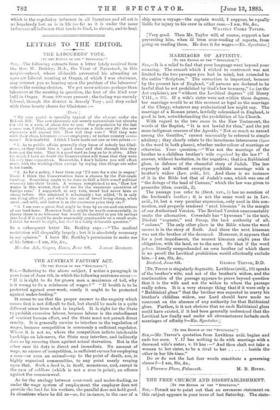THE AUSTRIAN FACTORY ACT.
[To THE EDITOR OF THE " SPECTATOR."] Sia,—Referring to the above subject, I notice a paragraph in your issue of June 6th, in which the following sentences occur :— " If it is right to fix for grown men a maximum of toil, why is it wrong to fix a minimum of wages ? " " If health is to be protected against over-work, surely it ought to be protected against under-feeding."
It seems to me that the proper answer to the enquiry which Comes first is not difficult to find, but should be made in a quite different sense from what is implied. It is right for the State to prohibit excessive labour, because labour is the embodiment of sentient human effort, and the State must not permit direct cruelty. It is generally unwise to interfere in the regulation of wages, because competition is commonly a sufficient regulator. Where it is not so, where the competition inflicts intolerable hardships on labourers, the State may interfere, and indirectly does so by securing them against actual starvation. But in the other case its duty is direct and immediate. No amount of wage, no excuse of competition, is sufficient excuse for employing a man—or even an animal—up to the point of death, nor, in highly organised communities, to any point nearly verging upon that. Such a deed is, in itself, monstrous, and, except in the case of soldiers (which is not a case in point), an offence against the commonweal.
As for the analogy between over-work and under-feeding, as under the wage system of employment the employer does not provide the food for his workers, the parallel does not hold good. In situations where he did so—as, for instance, in the case of a
ship upon a voyage—the captain would, I suppose, be equally liable for injury to his crew in either case.—I am, Sir, &c.,
WHATELY COOKE TAYLOR.
[Very good. Then Mr. Taylor will, of course, support a law preventing him, when ill from over-reading of reports, from going on reading them. He does it for wages.—En. Spectator.]


































 Previous page
Previous page